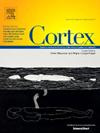行为变异型额颞叶痴呆症患者嗅觉奖赏处理的结构和功能相关性。
IF 3.2
2区 心理学
Q1 BEHAVIORAL SCIENCES
引用次数: 0
摘要
额颞叶痴呆的行为变异型(bvFTD)的症状包括对食物、酒精和金钱等奖赏的追求发生改变。然而,人们对这些奖赏变化与奖赏相关区域的萎缩和功能连接之间的关系知之甚少。本研究的目的是检测 24 名 bvFTD 患者对嗅觉奖赏的价值感知的结构和功能相关性。对静息态大脑功能连接的回归分析表明,腹侧苍白球与其他奖赏回路区域的连接,尤其是腹侧苍白球与双侧前扣带皮层/内侧前额叶皮层之间的功能连接,可以预测患者对嗅觉刺激的积极价值评价。结构分析表明,前扣带皮层的萎缩也与认为刺激更有奖赏显著相关。最后,腹侧苍白球连通性与前扣带皮层萎缩之间存在明显的交互作用。更具体地说,在前扣带皮层容量较低的情况下,腹侧苍白球连接对嗅觉刺激的积极感知有更大的影响。这些研究结果表明,奖赏相关区域的萎缩和功能连通性对bvFTD患者的愉快感产生了独立和相互作用的影响,这可能是由于享乐性 "喜欢 "信号的变化所致。本文章由计算机程序翻译,如有差异,请以英文原文为准。
Structural and functional correlates of olfactory reward processing in behavioral variant frontotemporal dementia
The behavioral variant of frontotemporal dementia (bvFTD) includes symptoms that reflect altered pursuit of rewards, including food, alcohol, and money. Little is known, however, about how these reward changes relate to atrophy and functional connectivity within reward-related regions. The goal of this study was to examine the structural and functional correlates of valence perception for olfactory rewards in 24 patients with bvFTD. Regression analysis of resting-state brain functional connectivity indicated that more positive valence ratings of olfactory stimuli were predicted by ventral pallidum connectivity to other reward circuit regions, particularly functional connectivity between ventral pallidum and bilateral anterior cingulate cortex/ventromedial prefrontal cortex. Structural analysis showed that atrophy of the anterior cingulate cortex was also significantly associated with perceiving stimuli as more rewarding. Finally, there was a significant interaction between ventral pallidum connectivity and atrophy of the anterior cingulate cortex. More specifically, the ventral pallidum connectivity had a greater effect on the positive perception of olfactory stimuli in the setting of low anterior cingulate cortex volume. These findings indicate that atrophy and functional connectivity within reward-relevant regions exert independent and interacting effects on the perception of pleasantness in bvFTD, potentially due to changes in hedonic “liking” signals.
求助全文
通过发布文献求助,成功后即可免费获取论文全文。
去求助
来源期刊

Cortex
医学-行为科学
CiteScore
7.00
自引率
5.60%
发文量
250
审稿时长
74 days
期刊介绍:
CORTEX is an international journal devoted to the study of cognition and of the relationship between the nervous system and mental processes, particularly as these are reflected in the behaviour of patients with acquired brain lesions, normal volunteers, children with typical and atypical development, and in the activation of brain regions and systems as recorded by functional neuroimaging techniques. It was founded in 1964 by Ennio De Renzi.
 求助内容:
求助内容: 应助结果提醒方式:
应助结果提醒方式:


